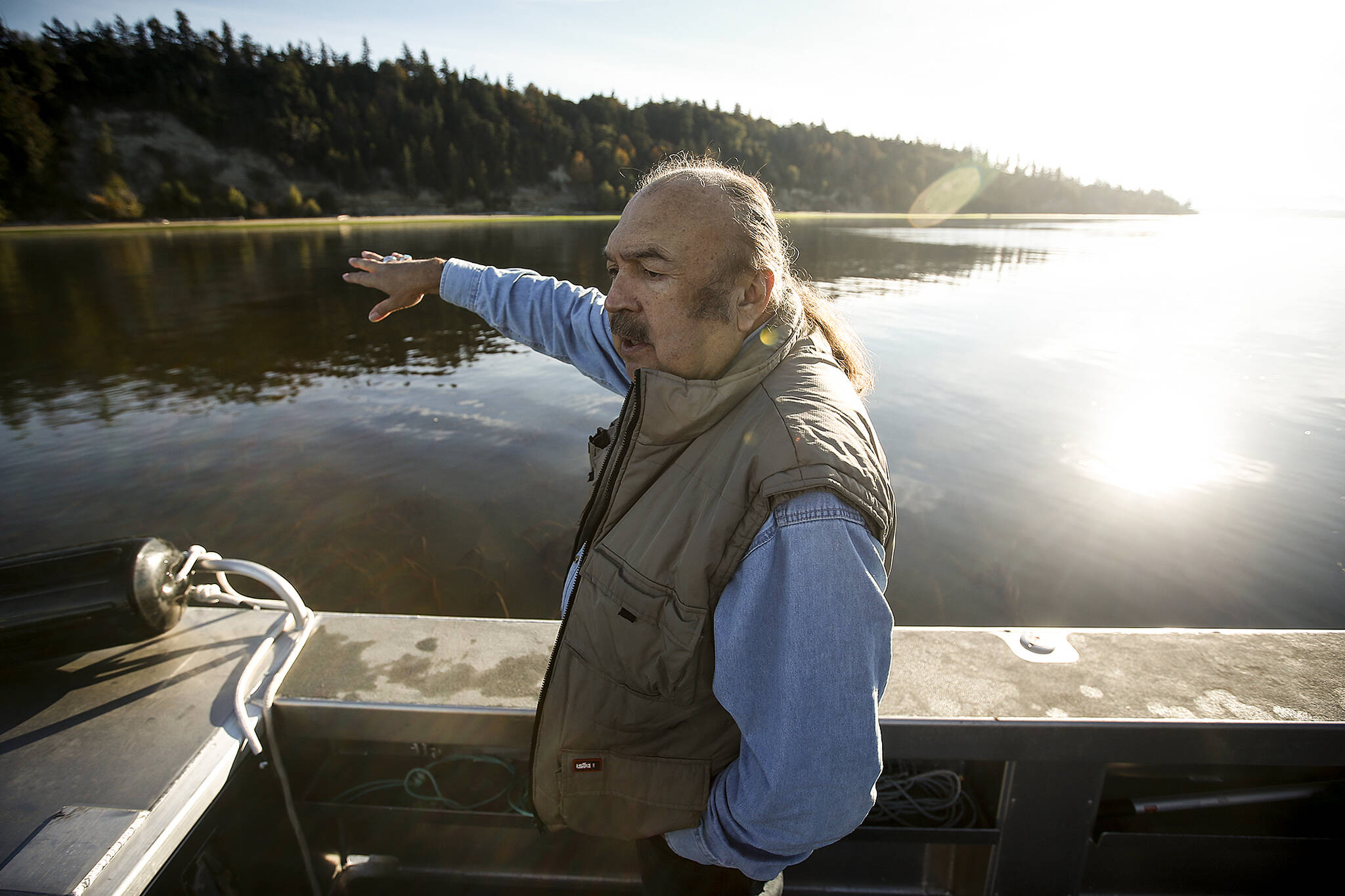TULALIP — When Snohomish County Executive Dave Somers looks down from a plane window, he sees Terry Williams.
“I look at the streams and I see the buffers,” said Somers, who worked alongside Williams in Tulalip for almost two decades. “… And that was Terry.”
The Tulalip tribal elder died this week at the age of 74. He “retired” just a few years ago, but remained hard at work launching salmon migration mapping programs and weighing in on local watershed management plans.
In the 1980s, Williams helped For nearly half a century, Williams stood at the forefront of the fight against climate change, often donning a bolo tie. His efforts to save the environment were “endless, nonstop,” Somers said.
In 1994, Williams logged 100,000 miles on an airplane and another 30,000 on the road for meetings on watershed maintenance, court cases on the effects of logging on stream health or talks with federal officials in D.C., The Daily Herald then reported. “For decades he’s been a champion of climate issues,” said Ryan Miller, Tulalip treaty rights director. “And just leading the way. He’s a big part of the reason why Tulalip has been at the forefront of a lot of these important issues.”
As the tribal liaison to the U.S. Environmental Protection Agency, and locally as the Tulalip Fisheries and Natural Resources Commissioner, Williams brought Indigenous knowledge and representation to the table.
He never saw people on the other side of an issue as his “enemy,” Miller said, “and I think that’s really, really difficult to do when you spend 40 years arguing with the same groups.”
In 1974, federal judge George Boldt ruled that an original treaty clause — which said tribes could take fish “in common with” non-Indians — meant that tribes were entitled to a 50-50 split.
Shortly after the Boldt decision, Williams helped create the first co-management system in the state, in which tribal and non-tribal fishermen divide the salmon harvest each year. He helped define tribes’ fishing rights alongside Tulalip Tribal Chair Stan Jones and Nisqually treaty rights activist Billy Frank Jr. Williams went on to negotiate the Pacific Salmon Treaty with Canada and its First Nations. It was backed by research developed by Tulalip staff scientists, like Somers.
“It was his life’s work,” said Teri Gobin, chair of the Tulalip Tribes.
Williams, a Vietnam veteran, was first hired on the Tulalip Tribes’ fisheries patrol. And when the fisheries director post opened up, he was encouraged to apply.
“For years there were 16-hour days, learning from biologists about the habitat and shadowing leaders onto the political front lines,” The Herald reported years ago.
When Williams started his career in the tribes’ natural resources department in the ’70s, he worked to understand climate change and find ways to slow its effects. He created the tribes’ Treaty Rights office.
In the ’80s, Williams regularly shared his guidance with a wider audience. He became a regional leader on the Northwest Indian Fisheries Commission and the Pacific Fisheries Management Council.
By the ’90s, he was appointed to the U.S. delegation to the United Nations Convention on Biological Diversity. Williams work has been felt internationally, Miller said.
Williams often tried to bridge communication gaps that got in the way of things like recovering salmon populations.
“It’s the authority of each individual agency, federal, state or local, that gives them the ability to create rules and standards,” Williams told The Herald in 2016. “Eleven agencies have independent programs and authorities in Puget Sound. Most are not geared toward Puget Sound recovery goals.”
So he helped bring the stakeholders together. He organized groups like the Northwest Straits Commission, Marine Resource Committees, Snohomish Salmon Recovery Forum, Snohomish Sustainable Lands Strategy and the Puget Sound Partnership Local Integration Organizations. Ultimately, Williams’ efforts and views were rooted in tradition: a deep respect for the environment, Gobin said.
When speaking at the Evergreen State College in 2009, Williams said white settlers were mistaken when they considered the Pacific Northwest to be natural and untouched. The lands have always been managed by Indigenous people.
Williams instilled this understanding in Miller, who began his career working at the tribes’ fish hatchery as a teenager. He heard Williams explain the significance of native plants and animals.
“If we lose these species that are so intrinsically connected to who we are, we lose part of ourselves,” Miller told the Herald in 2021. “It’s already difficult to pass on these traditions in modern societies. As these resources get more scarce, it becomes more and more difficult.”
Williams passed on other lessons to Miller, too, about how to get things done.
“He really taught me to not get down and upset when you’re dealing with difficult issues,” Miller said. “I used to watch him having those conversations and I would be upset. I’d be so mad about it. And Terry would be so calm.”
His family saw him as a bit of a paradox.
“He was always this quiet guy,” said Natalie Leighton, Williams’ niece. “… It was hard to balance the soft-spoken man I knew against the powerful man arguing climate change reform in Washington D.C.”
Somers teared up as he recalled Williams’ contributions.
“Just the power of his positive and creative spirit,” Somers said, “it was just amazing.”
Family and friends are invited to celebrate Williams’ life at 10 a.m. July 30 at the Tulalip Gathering Hall.
Isabella Breda: 425-339-3192; isabella.breda@heraldnet.com; Twitter: @BredaIsabella.
> Give us your news tips. > Send us a letter to the editor. > More Herald contact information.Talk to us

























